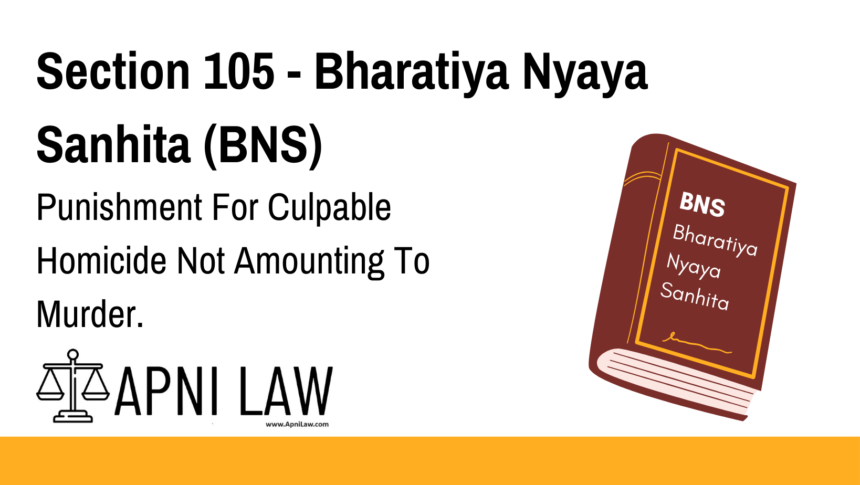Code: Exact Legal Provision
Whoever commits culpable homicide not amounting to murder, shall be punished
with imprisonment for life, or imprisonment of either description for a term which shall not be
less than five years but which may extend to ten years, and shall also be liable to fine, if the
act by which the death is caused is done with the intention of causing death, or of causing
such bodily injury as is likely to cause death; or with imprisonment of either description for
a term which may extend to ten years and with fine, if the act is done with the knowledge that
it is likely to cause death, but without any intention to cause death, or to cause such bodily
injury as is likely to cause death.
Explanation of Section 105 BNS
Section 105 of the Bharatiya Nyaya Sanhita (BNS), 2023, deals with culpable homicide not amounting to murder—a serious offense but less grave than murder. It is used when a person’s actions lead to death, but the intent or circumstances do not fulfill the criteria for murder under Section 103 BNS.
Key Provisions:
- Punishment Based on Intent
- If the act is done with the intention of causing death or bodily injury likely to cause death, the punishment is:
- Life imprisonment, or
- Imprisonment between 5 to 10 years, and
- Fine.
- If the act is done with knowledge that it may cause death, but without intent, the punishment is:
- Imprisonment up to 10 years, and
- Fine.
- If the act is done with the intention of causing death or bodily injury likely to cause death, the punishment is:
- Difference from Murder (Section 103 BNS)
- Murder (Section 103 BNS) requires a clear intention to cause death.
- Culpable homicide (Section 105 BNS) applies when there is either an intent to cause bodily harm likely to result in death or mere knowledge that the act may cause death, but without murderous intent.
Illustrations (Examples for Better Understanding)
Example 1: Intentional Bodily Harm Leading to Death
A gets into a heated argument with B and hits him on the head with a heavy rod. B dies due to the injury.
- Since A intended to cause grievous harm, but not necessarily death, it falls under culpable homicide not amounting to murder.
- A can be sentenced to life imprisonment or 5-10 years of imprisonment with a fine.
Example 2: Death Caused by Reckless Act (Knowledge but No Intent)
A rashly drives his car through a crowded street, knowing that it could cause fatal injuries. He hits a pedestrian, who later dies.
- Since A had knowledge that his act could cause death, but no intent, he faces up to 10 years of imprisonment and a fine.
Common Questions and Answers on Section 105 BNS
1. What is the key difference between murder (Section 103 BNS) and culpable homicide (Section 105 BNS)?
- Murder (Section 103 BNS) requires clear intent to cause death.
- Culpable homicide (Section 105 BNS) applies when:
- There is intent to cause injury likely to result in death, OR
- The accused knows that the act is likely to cause death but lacks intent.
2. What is the minimum punishment under Section 105 BNS?
- If intent to cause death or fatal injury is present → Minimum 5 years imprisonment.
- If only knowledge of possible death exists → No minimum punishment, but it can go up to 10 years.
3. Can a person charged under Section 105 get bail?
Yes, since culpable homicide not amounting to murder is a lesser offense than murder, courts may grant bail depending on the circumstances.
4. Does this section apply to accidental deaths?
No. If the death was purely accidental, then Section 105 BNS does not apply. Instead, the case may be considered under negligence (Section 281 BNS).
5. Can a person sentenced under Section 105 be released early?
Yes. Unlike life imprisonment under Section 103 BNS (murder), convicts under Section 105 BNS may be eligible for remission or parole, depending on the case.
Conclusion
Section 105 BNS ensures strict punishment for cases where death is caused, but the intention does not meet the threshold of murder. It distinguishes between intentional killing (murder) and acts causing death with lesser intent, making it a crucial legal provision in criminal law.
For expert legal guidance, visit ApniLaw today! 🚀











